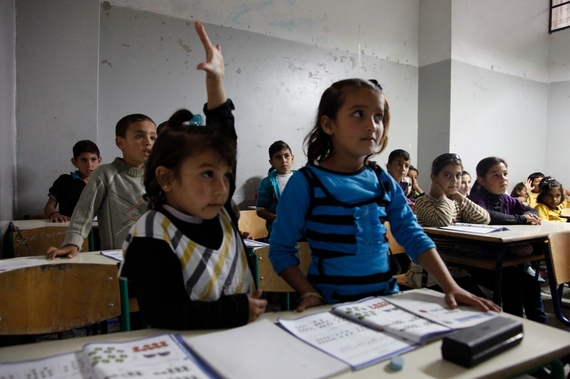For most of my career in education, easy clichés about school, well-worn phrases about its importance, and rote messages of uplift and inspiration flowed fairly easily from me. Then I went to the Middle East.
At the invitation of the State Department's U.S. Speaker's program, I visited Lebanon, Israel, and Palestine. And what I saw there felt as though someone ripped off a pair of smudgy glasses and gave me new ones. The platitudes I've lazily used about education shattered as I met teachers who, in the words of Palestinian poet Rafeef Zadiah, teach life.
In Gaza, I met teachers through a digital video conference who explained how the trauma of ongoing violence has created an unnerving status quo. "I have a hole in the ceiling of my classroom," one teacher told me. "Do you know how hard it is to convince a child that their dreams matter when there's been a hole in the classroom ceiling for months?" But, she explained, the teachers hope in their students. "We're traumatized too," she said. "But our trauma is helped by taking care of our students. By making them know they are worthy of dreams. They are not just a number or statistic."
In Lebanon, two young men explained the power of choice that education gave them. Both were products of the ACCESS program a U.S. funded initiative that uses the teaching of English to deliver American ideals through innovative lesson design. "I only had the madrassa," Mustafa Hamad, 21, said. "They taught me only despair, only death. ACCESS showed me life, showed me that my dream could happen." He is in college studying computer engineering. Another, Ibrahim Alsakhle, 22, equally enthusiastic about his experiences with ACCESS, decided to become a math teacher. "One sentence can change your life. It changed mine. My teacher said, 'There is better for you if you go to college.' So I did. I want my students to know that their brains matter," he said.
For some children in Lebanon, it's a matter of space and staff. The country is struggling to process an overflow of Syrian refugees straining their schools. "We have about 100,000 Syrian children in schools," Hilda El Khoury told me. "We have to have school in two shifts to accommodate them." I asked her what classes were like before the civil war that sent so many fleeing across the Lebanese border. "About 25 a class, average. That's doubled now."
Most chilling of all, El Khoury told me that it's the children they know are in the country, but can't be accounted for. "We know we have at least 200,000 children who are not in school," she said.
As a teacher, that number terrifies me. So many children deprived of learning, many of whom are in the most sensitive neurological phase for language, math, and science lessons.
Dr. Wafa Kotob, who, when explaining the woeful lack of professional teachers in Lebanon's public schools, nevertheless smiled at me and said, "But I'm an educator, so I have hope."
Hope. Peace. Dreams. These words were repeated in Israel where teachers design lessons to specifically bring these words into the lives of their students. At Sharet High School, teacher Sarah Dayan gave me a sticker that each student gets on the first day of school. It is the Golden Rule in Hebrew. The same is true at The Leo Baeck Education Center in Haifa where the school's flag is a symbol of a peace being planted and bearing fruit.
That's the thing about teachers. We can't worry about the politics. We have to worry about the children. We have to believe that the seeds we plant in our students will bear fruit in a better world. Teachers, and particularly those who teach in war zones, are a concrete symbol of the future. As long as there are teachers, there is life, there is a plan, a belief that things will get better.
But when you rip teachers out of a society, as in Syria, you've unraveled the future.
On the plane home, I couldn't shake the thoughts of all of those Syrian children who aren't in school. Though the children in Gaza are traumatized, they have teachers who love and care for them, who are a daily reminder that they exist and are worth care and concern.
The Syrian children who are "off the books" are like ghost children, existing in a limbo of waiting for war's end. They are learning. But what and from who?
These children deserve education. Their untapped potential, their wasted talent and creativity is a hidden casualty of a seemingly unending war. As a representative of the United States, I met many people who believe in and support education as our most powerful antiwar and anti-terrorism weapon. More information about this work is available here:

